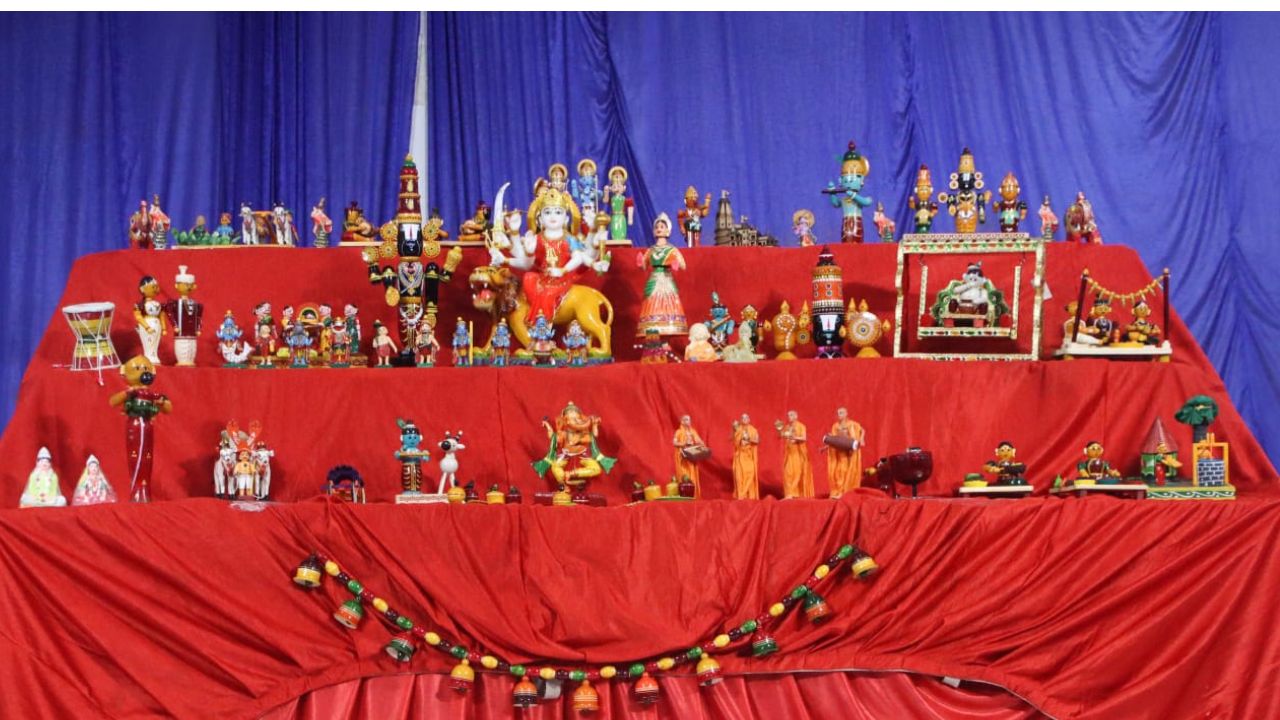Bommala Koluvu

Bommala Koluvu is a traditional South Indian festival where dolls and figurines, called “bommalu” in Telugu (meaning “dolls”), are arranged and displayed on tiered steps. This practice is particularly popular in states like Andhra Pradesh, Telangana, Tamil Nadu, and Karnataka. Bommala Koluvu is usually held during festivals such as Navaratri, Sankranti, and Dussehra, and is celebrated as a way to honor deities, preserve traditions, and foster social and cultural connections.
Key Features of Bommala Koluvu:
Doll Arrangement:
- The central feature of Bommala Koluvu is the artistic arrangement of dolls and figurines on multiple tiers, typically in odd numbers like 3, 5, 7, or 9 steps.
- These dolls can represent deities, mythological stories, cultural themes, daily life scenes, and even historical or modern figures.
Symbolism:
- The dolls on the top steps usually depict gods and goddesses, symbolizing divine hierarchy.
- Lower steps may represent people, animals, and scenes from everyday life. The arrangement symbolizes the interconnectedness of the universe, from the divine to the earthly.
Festival Connection:
- Navaratri (the 9-night festival dedicated to the Goddess Durga) is the most common time for this tradition. It is seen as a way of paying tribute to the goddess and inviting prosperity into homes.
- During Sankranti (the harvest festival), Koluvu is sometimes displayed as a mark of gratitude to the gods for a good harvest.
Community and Family Bonding:
- The festival encourages social interactions, as people invite family, friends, and neighbors to visit their homes to view the display, exchange sweets, and offer prayers.
- It fosters a sense of continuity and sharing, with many families passing down dolls through generations.
Cultural Preservation:
- The dolls often reflect the region’s mythology, folklore, and history, and this festival serves as a way to preserve and pass down these stories to younger generations.
- The custom is also a creative expression of craftsmanship, as many dolls are hand-made from materials like clay, wood, and metal.
Educational Aspect:
- For children, Bommala Koluvu is an opportunity to learn about Hindu mythology, traditions, and moral values. Elders often explain the stories behind the dolls and their placement.
Rituals and Prayers:
- Each day of the festival, the family performs pujas (prayers) in front of the dolls, offering fruits, flowers, and sweets to the deities.
- At the end of the festival, the dolls are respectfully taken down and stored away for the next year.
Purpose of Bommala Koluvu:
- Religious Devotion: It is a way to honor deities and seek their blessings for the well-being and prosperity of the family.
- Cultural Continuity: The tradition helps preserve and pass down stories and cultural practices, especially to younger generations.
- Social Engagement: It promotes bonding within the community as families visit one another to admire the doll displays.
In summary, Bommala Koluvu is a vibrant and symbolic tradition that brings families and communities together, preserves cultural heritage, and serves as a way to express creativity, devotion, and gratitude during major festivals.

